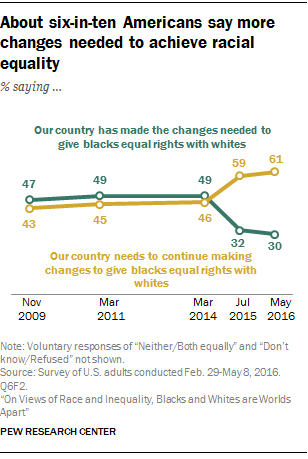
Most Americans say, as a country, we have yet to achieve racial equality. Roughly six-in-ten (61%) say that our country needs to continue making changes for blacks to have equal rights with whites, while 30% say we have made the changes needed to bring about equality. Blacks and Hispanics are particularly likely to say more work is needed to achieve racial equality, although more whites also say this is the case than say enough changes have been made.
Looking ahead, about four-in-ten (43%) blacks are skeptical that the country will ever make the changes needed for blacks to achieve equal rights with whites. Far lower shares among whites (11%) and Hispanics (17%) are doubtful that these changes will eventually take place.
Blacks and whites also offer different perspectives about the challenges black people face in the U.S. For example, whites are more likely to point to individual prejudice rather than institutional racism as the bigger problem when it comes to discrimination against black people today (70% citing individual prejudice vs. 19% saying institutional racism). Blacks are more evenly divided: 48% say individual prejudice is the bigger problem, while 40% point to discrimination that is built into the country’s laws and institutions.
Whites are also far less likely than blacks to say black people in the country as a whole and in their communities are treated less fairly than whites in dealing with the police, in the courts, when voting, in the workplace, when applying for a loan or mortgage, and in stores or restaurants. And while majorities of blacks say racial discrimination, lower quality schools and lack of jobs are major reasons blacks in the U.S. may have a harder time getting ahead than whites, far smaller shares of whites hold those views.
Most Americans say more changes needed to achieve racial equality
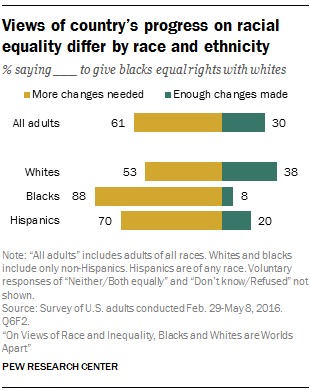
Roughly six-in-ten (61%) Americans say the country needs to continue making changes for blacks to have equal rights with whites; 30% say the country has already made enough changes. The share saying more changes are needed is virtually unchanged since the question was last asked in July 2015, but it is considerably higher than it was two years ago, before events such as the shooting death of an unarmed black 18-year-old by a white police officer in Ferguson, Missouri, and the racially motivated killing of nine black Americans in a Charleston, South Carolina, church. In early 2014, about as many adults said more changes were needed (46%) as said the country had already made all the changes necessary (49%) for blacks to have equal rights with whites.
Roughly nine-in-ten (88%) black Americans, including solid majorities across all demographic groups, say more needs to be done to achieve racial equality. A majority (70%) of Hispanics share this view. Among whites, more also say further changes are needed (53%) than say the country has already made the changes necessary for blacks to have equal rights (38%), but far larger shares of whites than blacks or Hispanics think the country has made the changes needed to achieve racial equality.
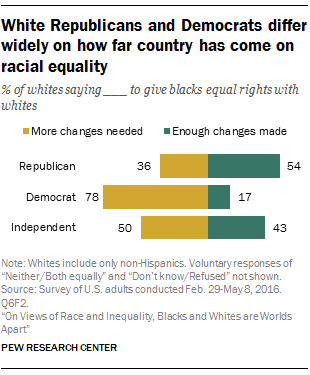
White Americans’ opinions about how far the country has come on racial equality vary drastically across party lines. White Democrats are more than four times as likely to say more changes are needed for blacks to have equal rights with whites (78%) than they are to say the country has made the necessary changes (17%). White Republicans, however, are more likely to say the country has already made the changes needed to ensure that blacks have the same rights as whites by a 54% to 36% margin. White independents are more evenly split.
Many blacks are skeptical that the country will make the changes needed for blacks to achieve equal rights with whites
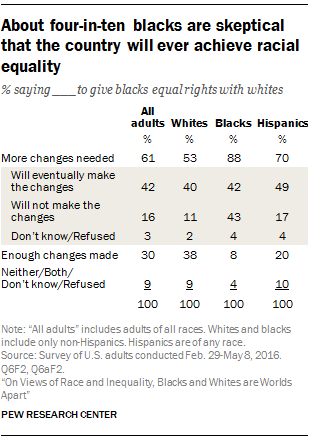
Of the 61% of Americans who say more changes are needed for blacks to have equal rights with whites, far more say these changes will eventually happen (42%) than say the country will not make the necessary changes (16%). Blacks are far more skeptical than whites and Hispanics about the prospect for racial equality.
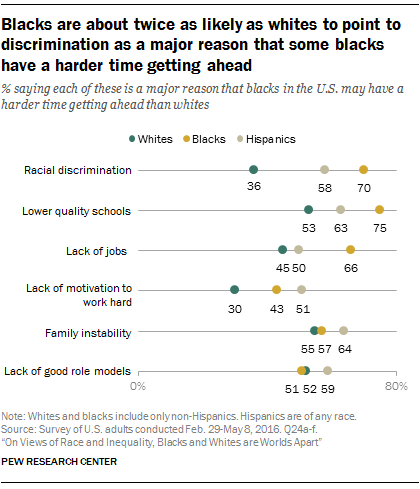
About four-in-ten (43%) black Americans believe the country will never make the changes needed for blacks to have equal rights with whites, while about the same share (42%) believe these changes will eventually be made. These views are shared about equally among blacks across demographic groups.
Whites and Hispanics are far less doubtful: just 11% and 17%, respectively, say the country will not make the changes needed for blacks to have the same rights as whites. Put differently, at least seven-in-ten whites (75%) and Hispanics (71%) who say the country still has work to do to achieve racial equality are optimistic that these changes will eventually take place.
Blacks and whites disagree on major factors holding black people back
When asked about reasons that black people in the U.S. may have a harder time getting ahead than whites, about six-in-ten Americans point to family instability (58%) and lower quality schools (58%) as major factors. About half (53%) say a lack of good role models or a lack of jobs (48%) are major reasons, and 45% point to racial discrimination. Fewer (35%) say lack of motivation to work hard is a major factor holding black people back. Majorities say each of these is at least a minor reason that blacks may have a harder time getting ahead than whites.
There is vast disagreement between blacks and whites about the extent to which racial discrimination may be contributing to a lack of progress for blacks. Fully seven-in-ten blacks say discrimination is a major reason blacks may have a harder time getting ahead than whites; 36% of whites share this view. White Democrats are far more likely than white Republicans and independents to see discrimination as a major factor holding black people back (56% vs. 18% and 36%, respectively).
By at least 20 percentage points, blacks are also more likely than whites to say lower quality schools (75% vs. 53%) and lack of jobs (66% vs. 45%) are major factors holding black people back. Blacks are also more likely than whites to say blacks may have a harder time getting ahead because they lack motivation to work hard; 43% of blacks say this is a major reason, compared with 30% of whites. 18
Among blacks, those with a high school education or less are more likely than those with some college education and those with a bachelor’s degree to say lack of motivation is a major explanation for why blacks may have a harder time getting ahead (51% vs. 40% and 31%, respectively). Education is also linked to white views on this. Roughly four-in-ten ( 37%) whites with a high school education or less and 33% of those with some college say lack of motivation is a major reason why blacks may have a harder time getting ahead, compared with 19% of whites with a college degree.
When it comes to family instability and lack of good role models, blacks and whites offer similar views. Roughly six-in-ten (57%) blacks and 55% of whites say family instability is a major reason that blacks may have a harder time getting ahead than whites. And about half of each group say the same about a lack of good role models.
Black and white adults who are married are about as likely as those who are not married to say family instability is a major factor holding black people back.
Most Americans say individual, rather than institutional, racism is the bigger problem for blacks
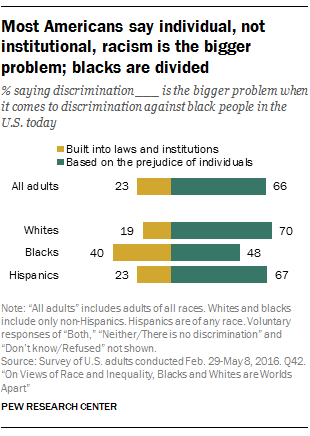
On balance, many more Americans say that, when it comes to discrimination against blacks in the U.S. today, individual prejudice is a bigger problem than discrimination that is built into our laws and institutions (66% vs. 23%).
Seven-in-ten whites and a similar share of Hispanics (67%) see individual racism as the bigger problem when it comes to discrimination against people who are black. Blacks, however, are more divided, although slightly more point to the prejudice of individuals (48%) than to discrimination that’s built into laws and institutions (40%).
Opinions about the type of discrimination that poses the biggest problem for black people don’t vary significantly across demographic groups, either for blacks or for whites.
Blacks more likely than whites to see unfair treatment in the country and where they live
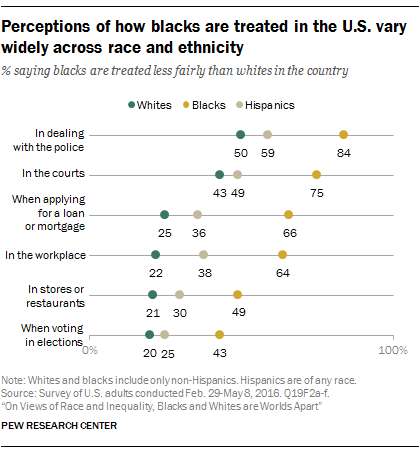
Across many realms of American life – including in dealing with the police, in the courts, when voting, in the workplace, when applying for a loan or mortgage, and in stores or restaurants – black adults are consistently more likely than whites to say blacks are treated less fairly, both in the communities where they live and in the country as a whole.
About eight-in-ten (84%) black Americans say blacks in this country are treated less fairly than whites in dealing with the police, and majorities also say blacks are treated less fairly in the courts (75%), when applying for a loan or mortgage (66%), and in the workplace (64%). Smaller but sizable shares of blacks say black people in this country are treated less fairly than whites in stores or restaurants (49%) and when voting in elections (43%).
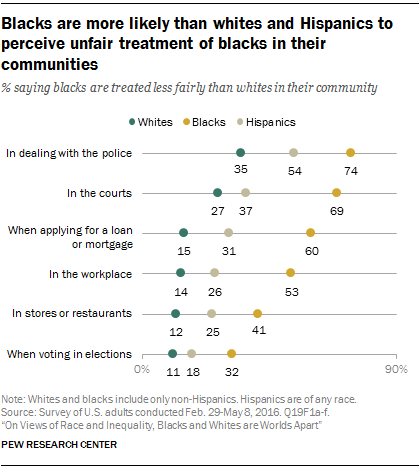
In contrast, half or fewer among whites say blacks in this country are treated less fairly than whites in dealing with the police (50%) and in the courts (43%), and a quarter or less see unfair treatment towards blacks when applying for a loan or mortgage (25%), in the workplace (22%), in stores or restaurants (21%) or when voting in elections (20%). At least half of whites say both groups are treated about equally in stores or restaurants, in the workplace, when applying for a loan or mortgage and when voting in elections; and about four-in-ten say this about the treatment of blacks and whites in dealing with the police or in the courts. Virtually no white adults say whites are treated less fairly than blacks in each of these realms.
By large margins, white Democrats are more likely than white Republicans and independents to say blacks are treated less fairly than whites in the U.S. across all of the items asked about in the survey. For example, about three-quarters (74%) of white Democrats say blacks are treated less fairly when dealing with the police, compared with 30% of white Republicans and 48% of white independents. And while at least half across partisan groups say blacks and whites in the U.S. are treated about equally when it comes to voting in elections, more white Democrats than white Republicans and independents say blacks are treated less fairly than whites (40% vs. 5% and 18%, respectively).
Blacks and whites also offer widely different views when asked to assess the way each group is treated in their own communities. For example, majorities of black adults say blacks in their community are treated less fairly than whites in dealing with the police (74%), in the courts (69%), and when applying for a loan or mortgage (60%). In contrast, about a third or fewer whites say blacks are treated less fairly in each of these situations (35%, 27%, and 15%, respectively).
However, across many measures, blacks and whites are more likely to say blacks are treated less fairly than whites in the country than they are to say this is the case in their own community.


 Interactive How blacks and whites view the state of race in America
Interactive How blacks and whites view the state of race in America